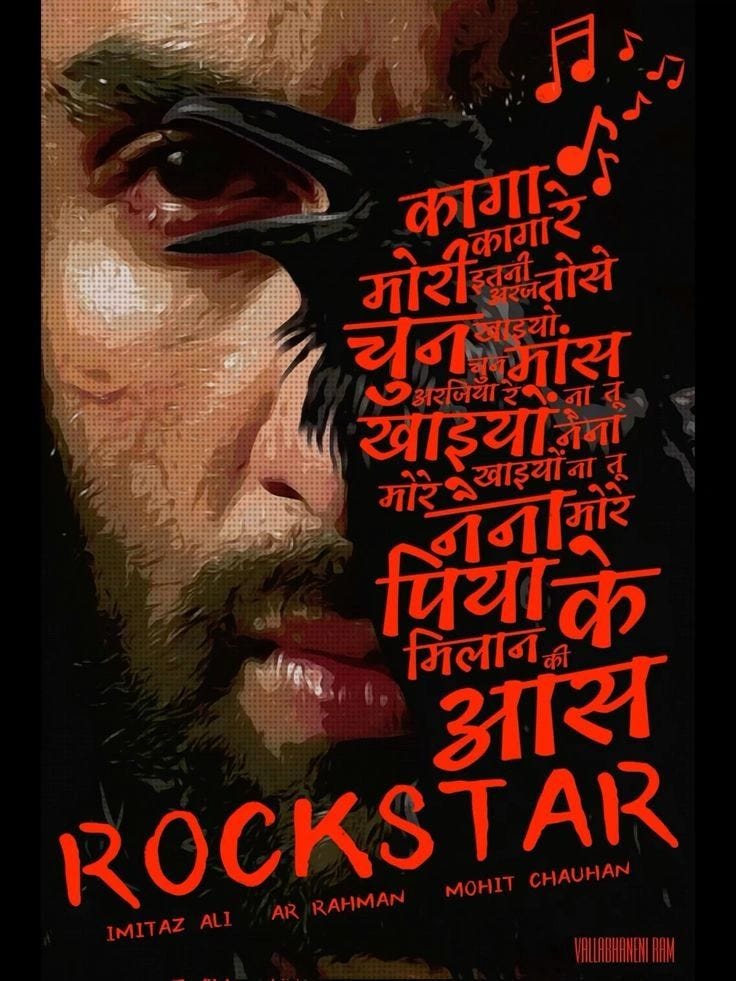Rockstar and Rebellion
When I was watching Rockstar with Anti Fragile Circle this Saturday, I was teleported back to 2011. I had just entered Ramjas College, Delhi. Rockstar just got released, Ranbir Kapoor as Jordan had North Campus on fire. Everyone was talking about him, and I too screamed Sadda Haq, Aithe Rakh.
But the truth is, I didn’t really understand Rockstar then. I understood it much later.
It was after my MBA, when I began moving through jobs, I turned into JJ myself. I travelled everywhere in search of clarity, in search of myself. Yet like him, I came back with the same restlessness. The truth of Rockstar is that it is not about music at all. It is about that endless hunger to find a place where your inner self finally feels understood. And that hunger rarely ends.
If you look closely, Bollywood has given us a whole lineage of films about this search for self. In 2001, Dil Chahta Hai captured the moment when urban youth first began to see friendship and freedom as identity-shaping forces. Ten years later, in 2011, Rockstar gave us the darker side of that search, the loneliness of being misunderstood by family, the ache of carrying a truth that others cannot see. By 2015, Tamasha flipped the lens. Instead of showing what happens when you go out to find yourself, it asked what happens when you try to hide who you really are in the routines of work and society. And then there was Swades, released in 2004, which told us that sometimes the answer to selfhood lies in returning to your roots, in building rather than wandering.
Seen together, these films become cultural texts that map out the dilemmas of a generation. From Goa to Corsica, from Delhi’s gullies to NASA’s campuses, the setting changes but the question remains the same: Who am I when I stop performing the role assigned to me?
For me, that question has never been theoretical. I too have lived the gap between what family expects and what I know I must do. I too have felt the ache of being misunderstood at home, of being told to fit back into the script. Someone recently told me that I am rediscovering my love for writing, as if it were an old friend I had left behind. Maybe that’s what JJ was doing too, through all his pain: rediscovering the one thing that was truly his.
The journey of self is not a single film or a single moment. It is an entire filmography. Sometimes you are Aakash from Dil Chahta Hai, running from commitment. Sometimes you are Mohan from Swades, finding meaning in service. Sometimes you are Ved from Tamasha, suffocated by routine. And sometimes, you are JJ from Rockstar, burning with an intensity that the world calls madness but which is really just truth.
Maybe that is why Bollywood returns to this theme again and again. Because in a country where family, society, and institutions constantly write scripts for you, the act of asking who you are is not just personal.
It is rebellion.
Notes:
Anti Fragile Circle is a small community of artists I run on WhatsApp. It does not look like a community at first glance. It looks like a set of groups: one for reading, one for art, one for music, one for travel, one for food. Yet taken together they form something that feels more alive than most institutions built with money, power, and plans.
Every Saturday we host silent reading sessions. There is nothing complicated about it. People show up, sit in silence, and read. Week after week, this simple act has continued without interruption, and the streak now stretches to 19 weeks. It does not need incentives. It sustains itself because the rhythm of sitting together with books has its own pull.
Recently we added movie screenings. Swades, Tamasha, and Rockstar have already played out on our collective screen. These too have found their place as natural extensions of the same instinct: gathering without fuss.
What keeps it together is not a constitution or a set of elaborate rules. It is a small group of people who treat it as their own. They carry the responsibility lightly but with seriousness. Their job is not administration in the usual sense. It is to ensure that every conversation remains human with the kind of exchanges you would want to remember.
When a space is run this way, it feels fragile and permanent at once. Fragile because it depends on trust rather than authority. Permanent because trust, once established, is harder to erode than any structure. Big organizations try to create culture through processes. Small groups do it by instinct. The paradox is that instinct lasts longer.
This is what Anti Fragile Circle has come to mean. A place that works because people run it like their own, with minimum rules and maximum care.

